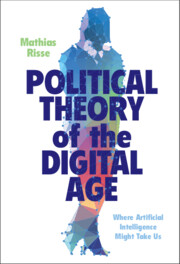Book contents
- Political Theory of the Digital Age
- Political Theory of the Digital Age
- Copyright page
- Dedication
- Contents
- Preface
- Acknowledgments
- 1 Introduction
- 2 Learning from the Amish
- 3 Artificial Intelligence and the Past, Present, and Future of Democracy
- 4 Truth Will Not Set You Free: Is There a Right to It Anyway?
- 5 Knowing and Being Known
- 6 Beyond Porn and Discreditation
- 7 The Fourth Generation of Human Rights: Epistemic Rights in Life 2.0 and Life 3.0
- 8 On Surveillance Capitalism, Instrumentarian Power, and Social Physics
- 9 Data as Social Facts: Distributive Justice Meets Big Data
- 10 God, Golem, and Gadget Worshippers: Meaning of Life in the Digital Age
- 11 Moral Status and Political Membership: Toward a Political Theory for Life 3.0
- Epilogue
- Bibliography
- Index
9 - Data as Social Facts: Distributive Justice Meets Big Data
Published online by Cambridge University Press: 02 February 2023
- Political Theory of the Digital Age
- Political Theory of the Digital Age
- Copyright page
- Dedication
- Contents
- Preface
- Acknowledgments
- 1 Introduction
- 2 Learning from the Amish
- 3 Artificial Intelligence and the Past, Present, and Future of Democracy
- 4 Truth Will Not Set You Free: Is There a Right to It Anyway?
- 5 Knowing and Being Known
- 6 Beyond Porn and Discreditation
- 7 The Fourth Generation of Human Rights: Epistemic Rights in Life 2.0 and Life 3.0
- 8 On Surveillance Capitalism, Instrumentarian Power, and Social Physics
- 9 Data as Social Facts: Distributive Justice Meets Big Data
- 10 God, Golem, and Gadget Worshippers: Meaning of Life in the Digital Age
- 11 Moral Status and Political Membership: Toward a Political Theory for Life 3.0
- Epilogue
- Bibliography
- Index
Summary
In the age of Big Data and machine learning, with its ever-expanding possibilities for data mining, the question of who is entitled to control the data and benefit from insights that can be derived from them matters greatly for the shape of the future economy. Therefore, this topic should be assessed under the heading of distributive justice. There are different views on who is entitled to control data, often driven by analogies between claims to data and claims to other kinds of things that are already better understood. This chapter clarifies the value of approaching the subject of control over data in terms of (a notion of moral, rather than legal) ownership. Next, drawing on the work of seventeenth-century political theorist Hugo Grotius on the freedom of the seas, and thus on possibilities of owning the high seas, I develop an account of collective ownership of collectively generated data patterns and explore several important objections. Since control over data matters enormously and is poorly understood, we should treat questions about it as genuinely open. This is a good time to bring to bear unorthodox thinking on the matter.
- Type
- Chapter
- Information
- Political Theory of the Digital AgeWhere Artificial Intelligence Might Take Us, pp. 183 - 206Publisher: Cambridge University PressPrint publication year: 2023

